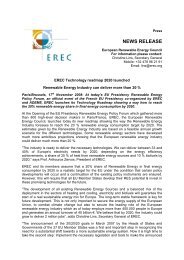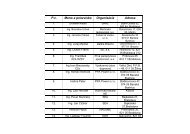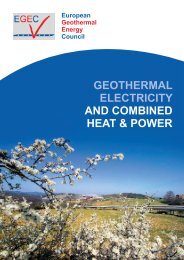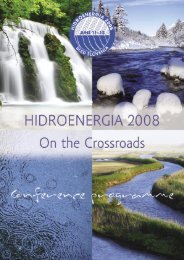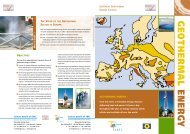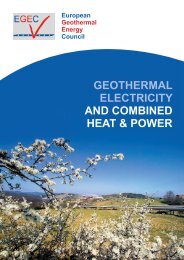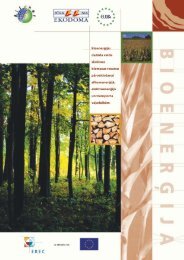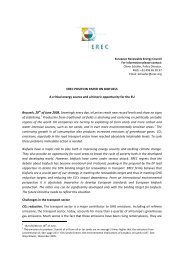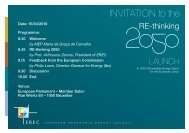CTO Assessment - European Commission
CTO Assessment - European Commission
CTO Assessment - European Commission
You also want an ePaper? Increase the reach of your titles
YUMPU automatically turns print PDFs into web optimized ePapers that Google loves.
LÜCHOW–DANNENBERG<br />
Energy and<br />
climate protection<br />
Contact: Marlene Sieck • Administrative District of Lüchow-Dannenberg<br />
Königsbergerstr. 10 o 29439 Lüchow o Germany • Tel: +49 5841120 445<br />
Fax: +49.5841 129278 • Email: m.sieck@luechow-dannenberg.de<br />
Lüchow-Dannenberg is a district of 51,000<br />
inhabitants, situated in the eastern fringe of<br />
Lower Saxony, North Germany. It is spread<br />
over 1,200 km 2 and has a very low population<br />
density (42 persons per km 2 ). It is located<br />
on the Elbe river which formed the<br />
boundary between West and East Germany<br />
before reunification. Agriculture and forestry<br />
are still important sectors but employment<br />
potential is in decline.<br />
The project which implements the goals of<br />
Agenda 21 locally, and in particular sets the<br />
target of 100% of energy supplied by RES<br />
within 10-15 years from 1999 onwards, using<br />
mainly wind power and biomass.<br />
Main motivations<br />
The growing debate concerning the possible<br />
building of a final nuclear waste disposal in a<br />
small village of the district, as well as the strong<br />
political will to act against the high percentage<br />
of unemployment and against losing its<br />
educated people, encouraged an alternative<br />
solution, such as RES implementation.<br />
A group involved in Agenda 21 initiated a<br />
round table of reflection in 1997 on the topic<br />
“Energy and climate protection” and discussed<br />
this issue.<br />
The project<br />
Since 2001, the various energy potentials have<br />
been identified and conversion scenarios for<br />
2015 have been prepared. The main objective<br />
was set to reach 100% RES. As a precondition<br />
to reach this goal the present energy consumption<br />
level must be reduced by 20%. An<br />
energy conservation competition gives prizes<br />
to the best actions taken each year.<br />
Key facts<br />
of the<br />
project<br />
90% of the electricity demand can be met by<br />
wind and biogas in the region. The main RES<br />
actions include the increase of wind turbines<br />
capacities installed: so far 8 wind turbines<br />
cover a total rated capacity of 4.8 MW, producing<br />
7 million kilowatt-hours electricity<br />
annually. A further 85 wind turbines could be<br />
installed but at the moment there are a lot of<br />
difficulties within the planning procedure due<br />
to nature conservation concerns.<br />
As well, several on-site biogas facilities have<br />
been installed at farms. A central biogas installation<br />
has just been built and is planned to<br />
provide 5000 households with electricity, using<br />
waste products coming from the starch<br />
factory (potato juice and pulp), as well as from<br />
maize, cattle and pig slurry delivered by the<br />
nearby farmers who hold shares. The heat<br />
produced within the installation is used to reduce<br />
by vaporization the fermentation substratum<br />
that is then returned to the farmers<br />
for use as fertilizer, but its volume is significantly<br />
reduced through this process, thereby<br />
decreasing truck traffic. Other actions include,<br />
for instance, the use of wood as fuel, the regions<br />
big forest timber potential suffices to<br />
produce 270,000 MWh heat and 30,000<br />
MWh power annually.<br />
Overall Evaluation<br />
Lüchow-Danneberg contributed to reduce<br />
environmental impacts, as well as to increase<br />
the value added in the region.<br />
The central biogas plant is a significant demonstration<br />
of successful economic biomass use.<br />
At the moment two more central biogas plants<br />
are planned. Because of the very poor budget<br />
situation of the district, which makes it im-<br />
PV Systems have achieved an output of 4,200 kWp<br />
Domestic hot water production ca. 1,900 m 2 in municipal plants and<br />
ca.15,300 m 2 in private plants<br />
District heating: 3,000 m 2<br />
Utility owned wind farm with a 1.5 MW capacity<br />
2 Biogas installations at 130 kW and one at 140 kW<br />
Medium temperature Geothermal with a heat capacity of 6-8 MW<br />
possible to invest in energy saving actions in<br />
public buildings, the district authority has concluded<br />
a contracting arrangement.<br />
The idea of 100% has been implemented in<br />
the district of Lüchow-Dannenberg through<br />
educational and awareness raising activities.<br />
Building upon contacts to universities and<br />
supra-regional research institutes, sustainable<br />
jobs could be created in the energy planning<br />
and management spheres. Lastly, several<br />
schools and kindergardens have installed<br />
photovoltaic units, financed by teachers and<br />
citizens. The planning and construction was<br />
exercised together with pupils, integrating an<br />
important educational and awareness raising<br />
dimension.<br />
Enabling factors<br />
The ideas coming out of the round-table on<br />
“Energy and climate protection”, set up in<br />
1997, were welcomed by the district administration<br />
and the local politicians. The district<br />
assembly passed a resolution to support these<br />
plans. Soon, there was a network of committed<br />
people in the different public and private<br />
sectors of the district enabled success in several<br />
initiatives.<br />
Challenges<br />
A great difficulty is the bad economic situation<br />
in Germany as a whole and in this remote<br />
rural area in particular. The construction of<br />
wind farms proceeds much more slowly than<br />
expected because of complicated planning procedures.<br />
Replication Potential<br />
The clear success of this local community on<br />
its way to sustainability is contributing to<br />
spread the message beyond the district and<br />
will encourage replication especially in rural<br />
areas of the accession countries. Polish contacts<br />
from the partner district to Lüchow-<br />
Dannenberg showed high interest in the energy<br />
activities and participated in several workshops.<br />
An exchange on RES with a delegation<br />
from Latvia took place in 2003.<br />
50 <strong>CTO</strong> - Showcase



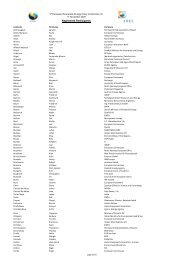
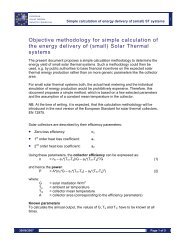
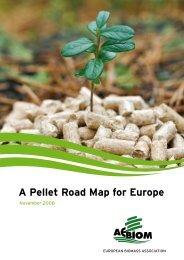
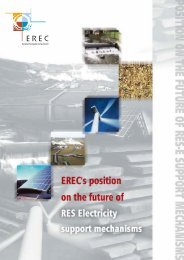
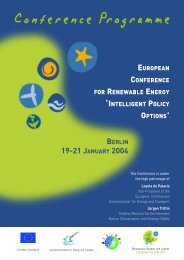
![Energy [R]evolution - Greenpeace](https://img.yumpu.com/47174859/1/184x260/energy-revolution-greenpeace.jpg?quality=85)
